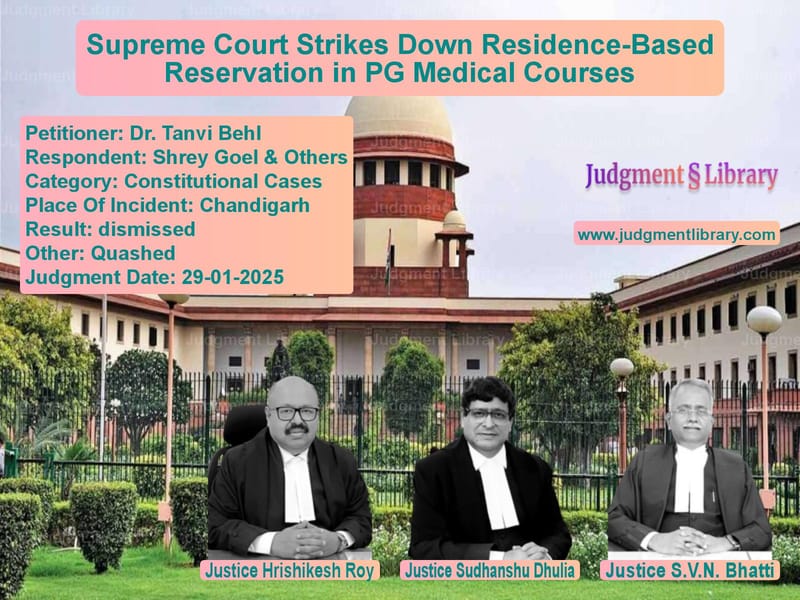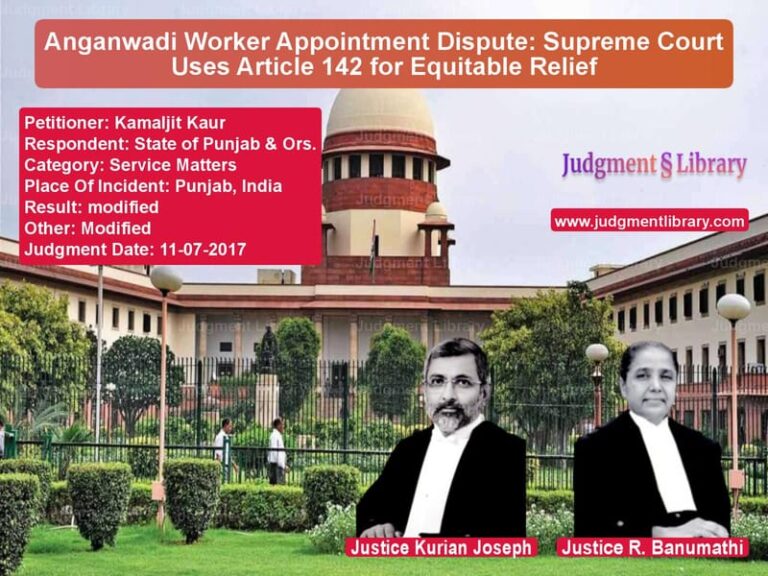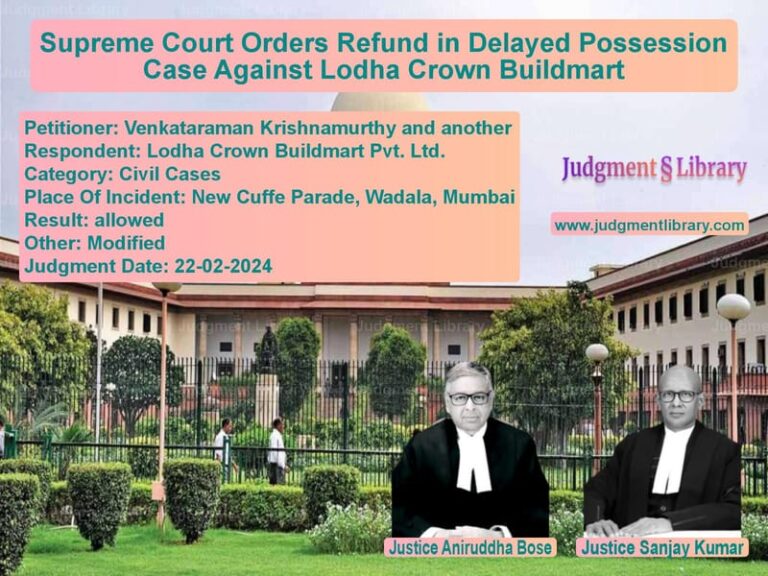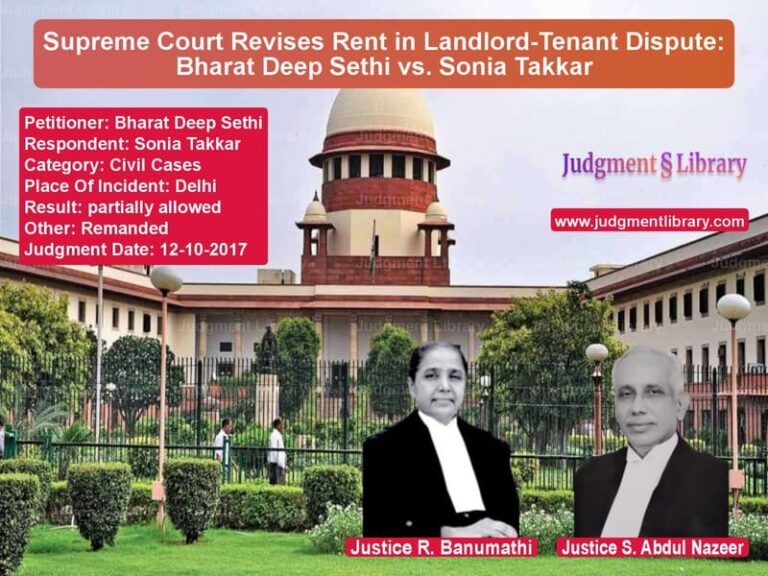Supreme Court Strikes Down Residence-Based Reservation in PG Medical Courses
The Supreme Court of India has delivered a landmark judgment in the case of Dr. Tanvi Behl vs. Shrey Goel & Others, striking down the practice of residence-based reservation in Postgraduate (PG) Medical Courses. The Court ruled that such reservations violate Article 14 of the Constitution and must be discontinued, except for a reasonable level of institutional preference.
Background of the Case
The dispute arose from the admission policy of the Government Medical College and Hospital, Chandigarh, which had 64 PG medical seats in its State Quota. These were allocated as follows:
- Institutional Preference Pool (IP): 32 seats for candidates who completed MBBS from the same institution.
- UT Chandigarh Pool: 32 seats for candidates fulfilling residence-based eligibility criteria.
The eligibility for the UT Chandigarh Pool required candidates to either:
- Have studied in Chandigarh for at least five years before applying.
- Have parents who resided in Chandigarh for at least five years before applying.
- Have parents who owned immovable property in Chandigarh for at least five years before applying.
Petitioners challenged this admission policy before the Punjab and Haryana High Court, arguing that residence-based reservations were unconstitutional. The High Court ruled in favor of the petitioners, holding that such reservations were impermissible in PG medical courses. The decision was then challenged before the Supreme Court.
Arguments Before the Supreme Court
Arguments by the Appellants (State of Chandigarh & Others)
The appellants, including the Chandigarh Administration and the Medical College, contended:
- Residence-based reservation was necessary to provide opportunities for local students.
- The policy was justified under Article 15 of the Constitution, which permits special provisions for socially and educationally backward classes.
- Since the state bore the cost of medical education, preference for local students was reasonable.
- Institutional preference and residence-based reservations were commonly practiced across various states.
Arguments by the Respondents (Petitioners Challenging the Reservation)
The respondents, led by Dr. Tanvi Behl, argued:
- The residence-based reservation was unconstitutional under Article 14, which guarantees equal opportunity.
- The Supreme Court, in Pradeep Jain v. Union of India (1984) and Saurabh Chaudri v. Union of India (2003), had already ruled that residence-based reservations were impermissible for PG medical courses.
- The UT Chandigarh Pool arbitrarily restricted competition and denied meritorious candidates admission opportunities.
- Medical education should focus on merit, not parochial considerations.
Supreme Court’s Analysis and Judgment
1. Residence-Based Reservation is Unconstitutional
The Supreme Court held that residence-based reservations violate Article 14 of the Constitution.
“Providing for domicile or residence-based reservation in PG Medical Courses is constitutionally impermissible and cannot be done.”
2. Institutional Preference is Permissible
The Court reaffirmed its ruling in Pradeep Jain (1984), holding that while institutional preference (reserving seats for students who completed MBBS in the same college) is valid, residence-based reservation is not.
3. Emphasis on Merit in PG Medical Courses
The Court emphasized the need to uphold merit in medical education:
“At the PG level, medical education is highly specialized, and merit cannot be compromised. The best talent must be selected to ensure excellence in healthcare.”
4. Previous Supreme Court Rulings on Domicile-Based Reservation
The Court cited several judgments reinforcing the principle:
- Pradeep Jain v. Union of India (1984): Held that residence-based reservations in PG medical courses violate Article 14.
- Jagadish Saran v. Union of India (1980): Stated that PG medical courses must focus on merit.
- Saurabh Chaudri v. Union of India (2003): Confirmed the impermissibility of residence-based reservations.
5. Clarification on Domicile vs. Residence
The Court clarified the distinction between domicile and residence:
“In India, there is only one domicile—domicile in the territory of India. State-wise domicile does not exist.”
Final Judgment
The Supreme Court struck down the residence-based reservation policy and upheld the High Court’s ruling:
“All admissions made based on residence-based reservations in PG medical courses are unconstitutional. The seats must be filled based on merit in NEET PG.”
The Court, however, allowed students already admitted under the previous policy to continue their courses.
Conclusion
This ruling reinforces merit-based admission policies and prevents discrimination based on residence. By striking down unconstitutional reservations, the Court has ensured equal opportunities for all students competing for PG medical seats nationwide.
Petitioner Name: Dr. Tanvi Behl.Respondent Name: Shrey Goel & Others.Judgment By: Justice Hrishikesh Roy, Justice Sudhanshu Dhulia, Justice S.V.N. Bhatti.Place Of Incident: Chandigarh.Judgment Date: 29-01-2025.
Don’t miss out on the full details! Download the complete judgment in PDF format below and gain valuable insights instantly!
Download Judgment: dr.-tanvi-behl-vs-shrey-goel-&-others-supreme-court-of-india-judgment-dated-29-01-2025.pdf
Directly Download Judgment: Directly download this Judgment
See all petitions in Fundamental Rights
See all petitions in Public Interest Litigation
See all petitions in Constitution Interpretation
See all petitions in Judgment by Hrishikesh Roy
See all petitions in Judgment by Sudhanshu Dhulia
See all petitions in Judgment by S.V.N. Bhatti
See all petitions in dismissed
See all petitions in Quashed
See all petitions in supreme court of India judgments January 2025
See all petitions in 2025 judgments
See all posts in Constitutional Cases Category
See all allowed petitions in Constitutional Cases Category
See all Dismissed petitions in Constitutional Cases Category
See all partially allowed petitions in Constitutional Cases Category







